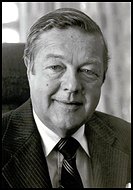Archer Kent Blood, 81, a career diplomat whose Blood Telegram
denouncing the complicity of the United States in "genocide" in the
former East Pakistan prompted his recall from his post as consul general in
Dhaka, died Sept. 3 of arterial sclerosis at a hospital in Fort Collins, Colo.
He had lived in Fort Collins since 1993.
Mr. Blood served for 35 years in the State Department, with postings in
Greece, Algeria, Germany, Bangladesh, Afghanistan and India.
He was the senior official among 20 members of the U.S. diplomatic corps who
signed the dissenting cable, which was prompted by the Pakistani military's
brutal crackdown against the Bengali inhabitants of what was known as East
Pakistan in March 1971. At least 10,000 civilians were massacred in the first
three days; the eventual civilian death toll might have been as high as 3
million. Some 10 million Bengalis, about 13 percent of East Bengal's
population, fled across the border into India.
In their cable, Mr. Blood and his fellow signatories charged: "Our
government has failed to denounce the suppression of democracy. Our government
has failed to take forceful measures to protect its citizens while at the same
time bending over backwards to placate the West Pakistan-dominated government.
Our government has evidenced what many will consider moral bankruptcy,
ironically at a time when the U.S.S.R. sent President Yahya Khan a message
defending democracy. . . ."
Writer Christopher Hitchens, in his 2001 book "The Trial of Henry
Kissinger," described the cable as "the most public and the most
strongly worded demarche, from State Department servants to the State
Department, that has ever been recorded."
President Richard M. Nixon and Secretary of State Henry Kissinger, seeking to
use Pakistan as a backdoor diplomatic opening to China, immediately recalled
Mr. Blood from his post. Although he had been scheduled for another 18-month
tour in Pakistan after home leave, he never returned to his post. He was
assigned to the State Department's personnel office.
Government sources told The Washington Post the next year that reports about
the magnitude of the killings were disbelieved at the time. State Department
officials considered the dispatches alarmist.
Although Mr. Blood received the Christian A. Herter Award in 1971 for
"extraordinary accomplishment involving initiative, integrity,
intellectual courage and creative dissent," his career suffered. "I
paid a price for my dissent. But I had no choice," he told The Post in
1982. "The line between right and wrong was just too clear-cut."
Mr. Blood, who was born in Chicago, graduated from high school in Lynchburg,
Va. He received his bachelor's degree from the University of Virginia,
graduating Phi Beta Kappa in 1943, and received a master's degree in
international relations from George Washington University in 1963.
He served as a naval officer in the North Pacific during World War II, and
joined the Foreign Service in 1947. During the last decade of his career in
the Foreign Service, he was acting ambassador to Afghanistan and served two
terms as charge d'affaires of the U.S. Embassy in New Delhi. He retired in
1982.
After his retirement, which he called "self-imposed exile," he was a
diplomatic adviser to the commandant at the U.S. Army War College in Carlisle,
Pa. Mr. Blood wrote the 2002 book "The Cruel Birth of Bangladesh: Memoirs
of an American Diplomat" and was professor emeritus of political science
at Allegheny College in Meadville, Pa.
Survivors include his wife of 56 years, Margaret Millward Blood of Fort
Collins; four children, Shireen Updegraff of Fort Collins, Barbara Rankin of
Denver, Peter Blood of Alexandria and Archer Blood of Shaker Heights, Ohio;
three sisters; and eight grandchildren.
